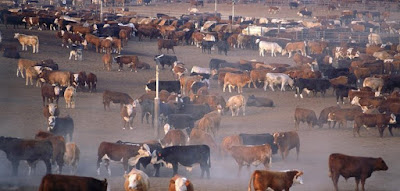 |
| Cutting down rain-forest to feed animals in factories... |
But many low carbohydrate diets are also heavily based on animal products. Cutting out processed or all carbohydrates while increasing animal fats and animal proteins might not be as harmful to the body as both combined. But I consider it still sub-optimal based on the research on health and longevity available today.
 |
| ...or growing trees to get our food directly? |
Methionine restriction is one intervention that can increase longevity independent of caloric restriction. And this can only be achieved if animal protein is drastically reduces. Almost all plant proteins have a lower methionine-content. And especially the foods that are part of a vegan ketogenic diet are also lower in methionine than animal products. If one aims for a total of 60-80gr of protein a diet derived from a diet of nuts, seeds, legumes, vegetables and soybeans, one arrives at a total methionine content of 0.8-1.2gr per day while still keeping carbohydrate in the range of 60-80gr. This is an optimally and slightly restricted level of methionine. The same amount of animal protein contains upwards of 2gr of methionine and oftentimes more than 3gr.
Therefore a vegan or vegetarian (only including high fat dairy products like butter) diet can combine the benefits of eating low carb with the benefits of a plant-based diet.
As the human body is capable of producing all the cholesterol required for optimal health, reducing its intake might lower heart disease risk. I say "might" because strictly animal based diets have shown to produce no arterial plaques. It seems that animal fat and protein only lead to damaged arteries in the presence of carbohydrates (and insulin).
 |
| Can we be sure that animals in factory farms are not suffering? |
The greatest benefits of eating plant-based high-fat compared to animal-based high fat is due to environmental and harm reduction reasons. We already see the devastating effects of more and more people increasing their consumption of animal products. Deforestation, enormous amounts of CO2 and Methane and animal suffering are only the most obvious reasons not to consume animal products. Even pasture fed animal and even wild game are a highly unsustainable source of food. The land required to produce that kind of food makes it immediately clear that eating animal products regularly is extremely harmful to nature and also humanity at large.
Compare this scenario (for which the complete list of bad outcomes would actually provide enough content to fill a book) to the scenario of feeding the world on a high fat vegan diet:
What is required for a high fat vegan diet? I would recommend mainly nuts as the healthiest source of calories. To achieve that we would convert a large portion of our current agricultural landscape. Away from highly unsustainable farming of grains (of which a large portion is wasted to feed livestock) to forests of nut trees, grown in a polycultural way that resembles good habitats for animals of all kind.
Instead of releasing huge amounts of CO2 and Methane into the atmosphere this way of producing food would filter the air, increase biodiversity, store CO2 in the ground, safely for a long time, and release oxygen into the air. From practices of permaculture, we already know: we would be able to produce a lot more food per acre and with much less effort than we do today. No need for fertilizers and the quality of the surface soil would increase dramatically. Perennial plants (trees) are able to access nutrients from much deeper layers and transport them to the surface. The prices for nuts and seeds would drop drastically and are therefore affordable to a large number of people.
This would require a change in our lifestyle, because these farming methods are not very suitable for mass-production and the use of heavy machinery. More people would need to live closer to nature again and directly work in the sector of food picking and care for the environment.
Maybe this is more of a cultural change that is required and therefore a huge shift in global trends is required. Away from living in large cities, where people live without their own gardens, to a society build around communal living, where everyone can easily derive their food directly from nature.
This would require a change in our lifestyle, because these farming methods are not very suitable for mass-production and the use of heavy machinery. More people would need to live closer to nature again and directly work in the sector of food picking and care for the environment.
Maybe this is more of a cultural change that is required and therefore a huge shift in global trends is required. Away from living in large cities, where people live without their own gardens, to a society build around communal living, where everyone can easily derive their food directly from nature.
Even this short presentation of the most obvious outcomes of a permacultural way of growing food in a forest should be enough to convert one from eating animal foods to eating plant foods. Even today, buying nuts and seeds in stores has probably a huge positive environmental effect over eating animals day in and day out. The more nuts that we consume, the more the farmers will plant those trees.